In Acupressure therapy,pressure-points on the entire body are used for diagnosing and treating a disease. Reflexology is very much a branch of Acupressure therapy. The only difference is that in Reflexology the pressure-points on the palms and soles are used for diagnosis and treatment. The pressure-points on the soles are more important than the pressure-points on the palms. The figure below shows which part of the sole is associated with which part of the body.
1. Pressure points and associated organs of the body
| Point number | Associated with | Point number | Associated with | Point number | Associated with |
| 1 | Energy center | 16 | Lungs and thymus glands | 28B. | Spleen (On the left palm) |
| 2 | Ear | 16A | Pitta (Bile) | 29 | Large intestines |
| 3 | Eyes | 17 | The outer portion of the shoulder | 30 | Small intestines |
| 4 | Psychological wellbeing, blood pressure, diabetes, Bleeding | 18 | The inner portion of the shoulder | 31 | Waist |
| 5 | Energy that prevents diseases, infection | 19 | Scapula (Shoulder blade) | 32 | The outer side of the waist, knee and ankle-bone |
| 6 | Neck and nose | 20 | Stomach | 33 | Urinary track, waist and the inner side of the knee and ankle-bone |
| 7 | Sinus close to the nose | 21 | Thyroid glands | 34 | Cancer, infection, bleeding |
| 8 | Sinus close to the eyes | 22 | Kidney | 35 | Cancer, diseases of anus such as piles |
| 9 | Throat | 23A. | Liver (On the right palm) | 36 | Testes or ovaries |
| 10 | Tonsils | 23B. | Heart (On the left palm) | 37 | Prostate gland |
| 11 | Temple, ear and mumps | 24 | Pancreas | 38 | Uterus |
| 12 | Eye muscles | 25 | Energy centre (Battery) | 39 | Penis |
| 13 | Cervical spondylosis | 26 | Knees, veins of the legs and part of the legs from the groin to the anklebone | 40 | Urinary tract |
| 14 | Pineal and pituitary glands, sleep | 27 | Adrenal glands | 41 | Vata (Gas) |
| 15 | Joints of the neck | 28A. | Gall bladder (On the right palm) |
2. Toes and the webs in-between
A. Little toe
The little toe is an energy centre (Point 1).When the little toe is pressed, the body gets charged with heat and we immediately obtain energy. Whenever someone feels excessively tired or becomes unconscious, if his little toe is pressed, the individual will become conscious. During an emergency, a patient can be saved by pressing his little toe.
B. The web between the little toe and the fourth toe
When pressure is applied to this web, the ears remain healthy (Point 2).
C. Web between the fourth and
the third (middle) toe and the fourth toe
Applying pressure to this web as well as the fourth toe helps maintain the eyes in good health and prevent using spectacles (Point 3).
D. Third (middle) toe
This is a very important toe from the perspective of maintaining the psychological balance. Apply pressure to this toe regularly to get rid of diseases such as blood pressure, diabetes that are associated with the mind, and to reduce other psychological ailments such as depression, madness, lust,jealousy. This toe is also important for curing any injury and stopping bleeding (Point 4).
E. Web between the third and the second toe
Applying pressure here increases the body resistance. Apply pressure to this point whenever there is any infection (Point 5).
F. Second toe
This toe has three points – those associated with neck and nose (Point 6), those associated with sinus of nose(Point 7) and those associated with sinus of eyes (Point 8).
G. Web between the second toe and the big toe
It is associated with the throat (Point 9) and tonsils (Point 10).
H. Big toe
Big toe is associated with the head. On its inner side, meaning on the side of the second toe, there are points associated with temple, ear and mumps (Point 11) and on the topside there are points associated with muscles of eyeball (Point 12).It is helpful to those who are squint-eyed. The outer side of the big toe has points associated with cervical spondylosis (Point 13), and points associated with pineal and pituitary glands (Point 14). In ailments such as insomnia, pain in the neck, apply pressure to this point. The root of the big toe (where it joins the feet) is also associated with neck (Point 15).
3. The front section of the sole, below the toes
Pressure on this section stabilizes the kapha (Phlegm). The points in this region are provided ahead.
A. In line with the web between the second and the third toe,there are two mounds. The point in this region (Point 16) isassociated with the lungs and thymus glands. This point is helpfulin all the ailments of children upto 12 years. Immediately below Point 16 is the point associatedwith pitta (Point 16A). It is useful in all pitta-related ailments so alsoin dry cough.
B. Below the fifth toe is the point associated with the outer partof the shoulder (Point 17) and below the big toe is the pointassociated with the inner part of the shoulder (Point 18).
C. The point for the shoulder joint is located in the webbetween two mounds below the root of the big toe and thesecond toe (Point 19).
4. The middle section of the sole
In the upper part of this section there are pressure-points associated with the stomach(Point 20), thyroid glands (Point 21), kidney (Point 22), liver (on the right sole) (Point 23A), heart (position same as that of 23A, buton the left sole) (Point 23B) and pancreas (Point 24). If this entire section is pressed with the roller, the functioning of all these organs improves.
Below the point for pancreas is the energy centre of the body(Point 25). For the body to functionproperly, this energy centre has to be in good condition.
On the three vertical lines in this central section is the point associated with the knees and part of the leg from the groin to the ankle-bone (Point 26). On the inner, middle and outer line are points associated with inner, middle and outer portion respectively of the knees. In this region, on the lower side of the point for the stomach is the point for Adrenal glands (Point 27). Apply pressure to this point to eliminate shivering.
On the lower side of the central portion are the points associated with liver (On the right sole) (Point 28A), Spleen(position same as that of 28A, but on the left sole) (Point 28B),large and small intestines (Point 29 and 30 respectively) and the waist (Point 31). Application of pressure to these points brings about balance of pitta and vata within the body and thereby,improves digestion, the body becomes agile. Actions such as sitting, standing, bending can be performed easily.
5. Heel
On the outer side of the heel there are important pressure-points.
A. Outer edge of the heel
This region has the point associated with the outer side of the waist, knees and ankle-bone(Point 32). Applying pressure with a roller reduces the vata in the anus, and reduces the pain or sprain in the knees and ankle-bone.
B. Inner edge of the heel
This is a very important section.Applying regular pressure to this section results in ejection of waste from the body. It includes the point for the urinary track,waist and the inner side of the knee and ankle-bone (Point 33).Point 34, which is immediately below this point is associated with ailments of cancer, bleeding and infection. In all types of infections,bleeding, menstrual problems, cancer apply pressure to this portion(Point 34 and 35) regularly with the roller. This section is very helpful in treating urinary problems such as increase in uric acid.
C. Lower edge of the heel
This section of the heel is useful in treating diseases of the anus – piles and cancer. (Point 35).


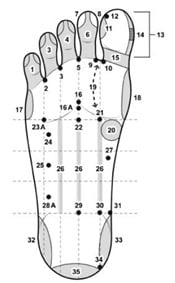
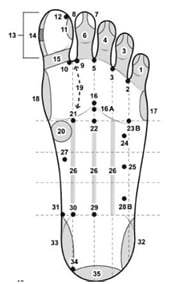


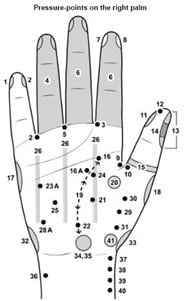
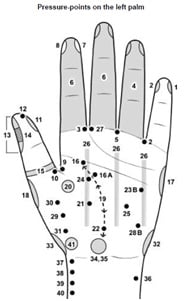
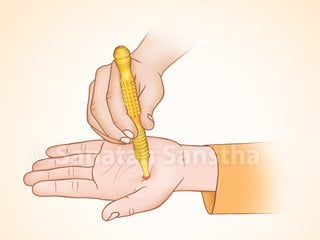 Important pressure-points on the body
Important pressure-points on the body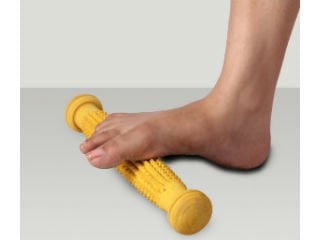 Aspects to be considered before attempting Acupressure treatment
Aspects to be considered before attempting Acupressure treatment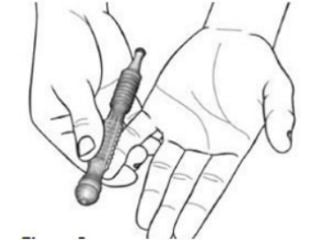 Instruments used in Reflexology
Instruments used in Reflexology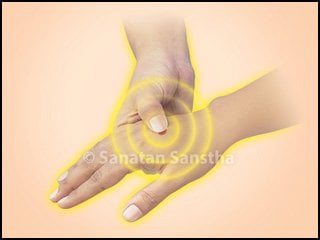 Importance of Science of Acupressure
Importance of Science of Acupressure